NORTH WALES COAST RAILWAY:NOTICE
BOARD
Rheilffordd arfordir gogledd Cymru: Hysbysfwrdd
23 July 2012
 Last issue
Last issue Archive
Archive Share this issue:
Tweet
Contributions and comments are encouraged: see the Contributions Page
This site is dedicated to all our regular contributors and supporters, and especially the rail staff of North Wales.
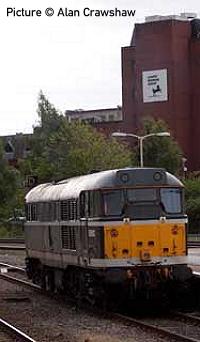
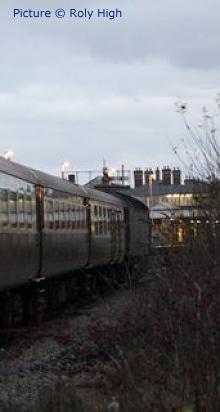
Forthcoming events
July 2012
Sat / Sun 28 - 29 July Llangollen Railway 1960s weekend
Sunday 29 July Steam in North Wales Railway Touring Company 'North Wales Coast Express' Liverpool Lime Street, Broad Green, Warrington Bank Quay, Frodsham and Chester to Llandudno, Llandudno Junction, Bangor and Holyhead (arr 14:30 dep 16:30).
Tuesday 31 July Steam in North Wales Railway Touring Company 'The Welsh Mountaineer' Preston, Warrington Frodsham, Chester to Llandudno Junction and Blaenau Ffestiniog (arr. 13:15 dep 16:10)
[Note: again this summer there are no steam trains on the Cambrian Coast line due to the rail industry's continuing inability to adapt the new ERTMS signalling for use with a steam locomotive.]
August 2012
Sat / Sun 4 - 5 August Talyllyn Railway Tom Rolt
Steam & Vehicle Rally
Sunday 5 August Steam in North Wales Railway Touring Company 'North Wales Coast Express' Crewe, Wilmslow, Stockport, Manchester Piccadilly, Frodsham and Chester to Llandudno, Llandudno Junction, Bangor and Holyhead (arr 15:10 dep 17:45).
Sunday 12 August Steam in North Wales Railway Touring Company 'North Wales Coast Express' Crewe, Wilmslow, Stockport, Manchester Piccadilly, Frodsham and Chester to Llandudno, Llandudno Junction, Bangor and Holyhead (arr 15:10 dep 17:45).
Tuesday 14 August Steam in North Wales Railway Touring Company 'The Welsh Mountaineer' Preston, Warrington Frodsham, Chester to Llandudno Junction and Blaenau Ffestiniog (arr. 13:15 dep 16:10)
Saturday 18 August Steam in North Wales Vintage Trains 'The Welsh Dragon' Tyseley - Blaenau Ffestiniog (Steam loco 5043 as far as Llandudno Junction; Class 47 diesel to Blaenau)
Sunday 19 August Steam in North Wales Railway Touring Company 'North Wales Coast Express' Liverpool Lime Street, Broad Green, Warrington Bank Quay, Frodsham and Chester to Llandudno, Llandudno Junction, Bangor and Holyhead (arr 14:30 dep 16:30).
Sat / Sun 25 - 26 August Llangollen Railway Classic Transport weekend
Sunday 26 August Steam in North Wales Railway Touring Company 'North Wales Coast Express' Liverpool Lime Street, Broad Green, Warrington Bank Quay, Frodsham and Chester to Llandudno, Llandudno Junction, Bangor and Holyhead (arr 14:30 dep 16:30).
Tuesday 28 August Steam in North Wales Railway Touring Company 'The Welsh Mountaineer' Preston, Warrington Frodsham, Chester to Llandudno Junction and Blaenau Ffestiniog (arr. 13:15 dep 16:10)
Saturday 31 August - 2 September Llangollen Railway Autumn Steam Gala
September 2012
Sun / Mon 1 - 2 September Llangollen Railway Autumn Steam Gala (continued)
Friday 7 September Clwyd Railway Circle Glyn Jones “John Summers & Sons Ltd” A look at the Steelworks at Shotton from its opening in 1896 to the closure of the heavy end in 1980. The talk includes footage of the iron ore trains from Bidston.
Thursday 13 September Llandudno and Conwy Valley Railway Society Keith Jones with a double barrelled show of “The History of Penmaenmawr Quarry & its rail system” followed by “Building and running miniature steam locomotives”
Saturday 22 September Llangollen Railway Diesel Day
Thursday 27 September LCGB North West John Owen "Vintage US Steam in Cuba"
October 2012
Friday 5 October Clwyd Railway Circle Les Nixon “55 Years of Railway Photography (part 1)” The acclaimed railway photographer and entertaining speaker will treat us to an evening of nostalgia, including pre 1968 steam, foreign, modern traction and some preservation. The accent is on the unusual.
Thursday 11 October Llandudno and Conwy Valley Railway Society John Barden Davies tells us “How railways made North Wales a Tourism destination”
Thursday 25 October LCGB North West Tom Heavyside "B R in the North West"
November 2012
Friday 2 November Clwyd Railway Circle Dave Southern “Chester to Pwllheli” The slide show will follow a journey from Chester to Pwllheli via Oswestry. There will be slides of each of the lines we pass on the journey, based on the early 1960's.
Thursday 8 November Llandudno and Conwy Valley Railway Society AGM followed a look at “The Llandudno Transport Festival over the Years” (Guest Speaker)
Thursday 22 November LCGB North West Norman Matthews "Steam in New Zealand"
December 2012
Friday 7 December Clwyd Railway Circle “Members Night & Christmas Celebration” Members are invited to give a 15/20 minute presentation of their choice (any format). This will be interrupted by festive treats (all high calories). Members must book their slot with David Jones no later than 20 November.
Thursday 13 December Llandudno and Conwy Valley Railway Society Christmas Social helped along by members Alex Cowan confirming to us that “Trainspotting was an education” and Larry Davies taking us back to “1962 – a year of change”
Thursday 13 December LCGB North West Les Nixon "55 Years of Railway Photography – Part Two"
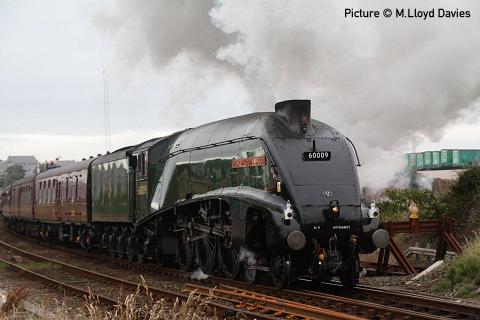
The Crewe - Manchester - Holyhead 'North Wales Coast Express' of 22 July has produce a wonderful crop of pictures, which are going to need a page of their own, which should be ready by Friday morning. All other contributions welcome. For now, here's one by M.Lloyd Davies of 60009 Union of South Africa in full cry heading out of Holyhead.
Conwy Valley locomotive ban
Hard on the heels of the '11-coach Trains to London at Llandudno' fiasco, a notice has been issued to staff stating that due to a 'gauging issue' with both platforms at North Llanwrst, all locomotives including steam, mark1 and mark 2 coaching stock, freight trains and track maintenance machines are prohibited from passing through North Llanwrst 'until further notice.'
We believe it has been discovered that a train has come into contact with the platform edge; the most recent loco-hauled working was the 'Royal Scotsman' but we don't know if that was the victim. Perhaps paint samples are being analysed as we write. Let's hope they can find a big hammer and sort this out before 31 July when the 'Welsh Mountaineer' steam excursion is due to pass that way.
Timetable Tinkering
Thanks to their application form posted on the Network Rail website, users have become aware of significant changes to Monday - Friday North Wales services which Arriva Trains Wales are planning, to take effect from 17 September.
Already reported is the conversion of the north-south Premier to push-pull with a Class 67, four Mk3 coaches and a Driving Van Trailer, allowing the train to reverse at Chester and so be routed via Wrexham. The 05:32 Holyhead - Cardiff will run via Wrexham and the 05:11 Holyhead - Birmingham will run via Crewe. The path of the 07:40 Crewe - Shrewsbury is taken by the 05:32 Holyhead - Cardiff and is replaced by an 06:38 departure from Crewe.
An additional 07:00 Shrewsbury - Wrexham General and an additional 07:47 Wrexham General - Shrewsbury will run, allowing passengers from stations between Wrexham and Shrewsbury to connect at Shrewsbury into the 05:32 Holyhead - Cardiff. In the evening, the 16:15 Cardiff-Holyhead via Crewe is replaced by a [railcar operated] 16:21 Cardiff-Chester, also via Crewe. The 18:21 Cardiff-Holyhead will be worked by the loco-hauled set in place of the present class 175 but the routeing, via Wrexham, is unchanged.
On the North Wales coast, 'several diagramming alterations' have caused changes which have a severe affect on the service to Llandudno, whilst re-introducing some through between Manchester, Bangor and Holyhead which were sacrificed some years ago on the altar of a 'clockface' timetable. The list is as follows:
06:50 Manchester Piccadilly to Llandudno will terminate at Llandudno Jn
05:10 Cardiff Central - Holyhead diverted to Llandudno
07:50 Manchester Piccadilly - Llandudno will now be diverted to Bangor
07:09 Birmingham International - Holyhead diverted to Llandudno
08:50 Manchester Piccadilly - Llandudno diverted to Holyhead
10:02 Additional train Chester - Llandudno
10:50 Manchester Piccadilly - Llandudno diverted to Bangor
07:51 Holyhead - Cardiff Central to start from Llandudno at 08:30
08:45 Llandudno - Manchester to start from Llandudno Jn at 08:54
09:08 Llandudno - Llandudno Jn is cancelled
09:28 Llandudno Jn - Llandudno is cancelled
10:08 Llandudno - Llandudno Jn is cancelled
10:28 Llandudno Jn- Llandudno is cancelled
13:08 Llandudno - Llandudno Jn is cancelled
13:28 Llandudno Jn - Llandudno is cancelled
10:33 Holyhead - Cardiff Central to start from Bangor at 11:02
13:44 Llandudno - Manchester to start from Bangor at 13:31
Arriva say that 'These changes more suitably reflect customers' requirements and also make better use of Arriva Trains Wales' rolling stock.' Looking at the list, it appears that the second of those requirements has taken priority; notice how all nearly all the changes are in the mornings, so Mancunians can get a direct train to Bangor and Holyhead in the morning, but they can't get one back after the 13:31 from Bangor. The extra Llandudno town - Junction shuttles were something of an experiment, so perhaps they won't be missed. As far as we know there has been no consultation with 'stakeholders' about the changes - unless anyone knows better.
Comments welcome...
The big sports event
There are football matches taking place in Cardiff from 25 July onwards as part of the Olympics, and Arriva Trains Wales have put up a special page with details and arrangements for passengers, although not being official sponsors, the absurd rules prevent them from mentioning the Olympic Games by name. We have heard that the loco-hauled train is to be used for some workings connected to the Olympics, but the website does not appear to mention this.
Chester Arts Festival 1967 - part 2
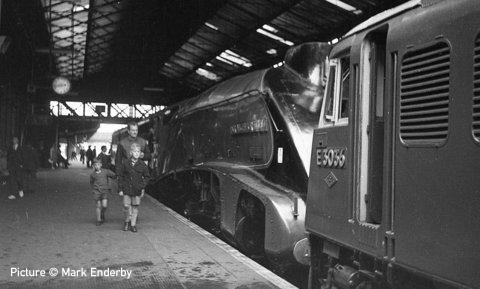
Robert Meredith's notes about the Chester Festival of the Arts locomotive exhibition and excursion in 1967 (2 July issue) struck a chord with two of our readers. Mark Enderby sends these pictures, which reveal (above) that the electric locomotive on display alongside 4498 Sir Nigel Gresley and 4472 Flying Scotsman was E3036. This was the first of a small batch of ten ordered from GEC and built the North British company (class AL4) for use on the West Coast Main Line electrification and delivered in 1960; note the diamond-shaped works-plate below the number which was that firm's trademark. Unfortunately, like the diesel locos built by North British, they were not a success. By 1967 all ten had been stored out of service, which would be why one could be spared for the exhibition.
They eventually were overahauled and returned to traffic in 1971-72, becoming Class 84, but by 1980 all had been withdrawn again. All were scrapped, except, as it happens, as none other than Chester exhibit E3036, by then renumbered 84 001, which was claimed by the National Railway Museum and is now on long-term loan to the AC Locomotive Group which keeps it at Barrow Hill depot. It is fact the only survivor of all the diesel and electric main line locos (i.e. not shunters) built for British Railways by North British. Most likely it was towed to Chester by the steam traction. Perhaps one day an AC electric loco will reach Chester under its own power?
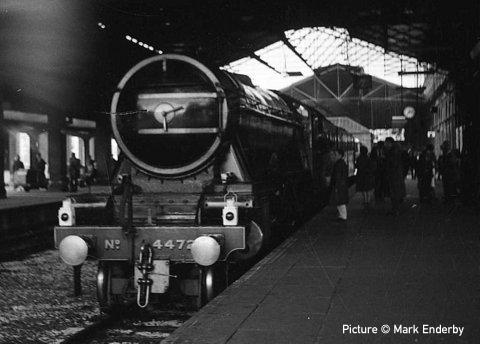
Mark writes that he met Alan Pegler, the owner of Flying Scotsman, and obtained his autograph. Merfyn Jones writes: 'My main memory of the event in Chester station in 1967 was of the two Gresley pacifics. You were not only allowed in the cabs but also the corridor tenders. It was possibly a unique event that enabled you to walk from one loco cab to the other without stepping outside. Via three corridor tenders!'
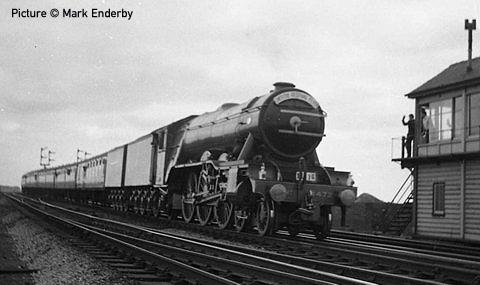
Mark's third picture shows Flying Scotsman heading the excursion from Chester to Blackpool on 9 July 1967, passing Walton New Junction box near Warrington. The second tender, purchased by Alan Pegler to allow longer runs without stops for water once water troughs were removed from main lines, can be clearly seen.
It is notable that all three locos on display back in 1967 still exist today. Sir Nigel Gresley, currently in BR guise as 60007, is very much alive at the North Yorkshire Moors Railway and is registered for use on main line excursions, although two planned for September 2012 have been cancelled by their operators. Flying Scotsman, on the other hand, has been undergoing a seemingly-endless and costly overhaul by the National Railway Museum; hopefully it will steam again, as many people have donated money towards this since it has been in care the museum following a series of adventures under private owners.
Diesel Diversity
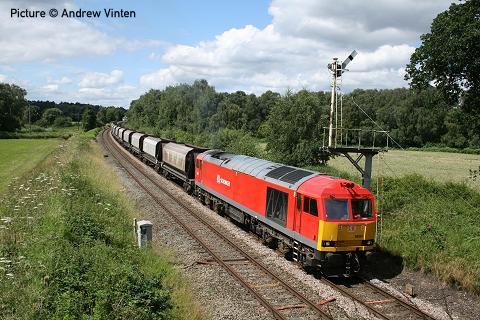
Locomotives continue to be a major source of interest among enthusiasts, and although it sometimes seems there are only a couple of types left, we receive pictures showing quite a variety. Here is a selection; some rather away from North Wales but why worry? Thanks to everyone who has contributed. Above: Class 60s are now receiving overhauls and the British version of DB Schenker's livery. The Tunstead - Northwich limestone trains are one of their usual haunts, such as 60 054 at Plumley on 12 July. Picture by Andrew Vinten.
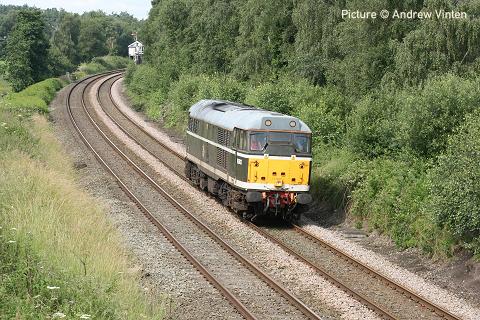
Green and pleasant Plumley on 12 July again, and 31 190 (also known as D5613) forms a route-learning special for drivers which was running from Warrington to Ashburys (Manchester) via Chester (Andrew Vinten). This loco is in the fleet of Devon and Cornwall Railways (DCR), operating arm of British and American Railway Services, which itself is owned by Iowa Pacific Holdings, operator of 'short lines' in the USA and other rail-related businesses. DCR hopes to get a foothold in the UK freight market.
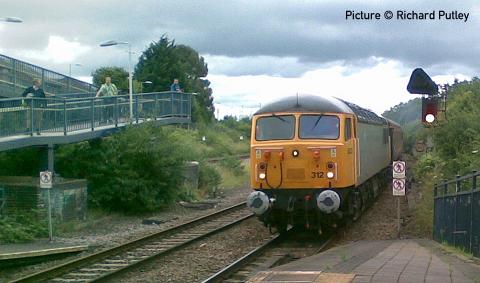
DCR has also been collecting Class 56 locomotives: above is 56 312 heading south through Filton Abbey Wood (near Bristol) hauling a few empty ex-Virgin Mk2s at around 17:30 on 10 July (Richard Putley).
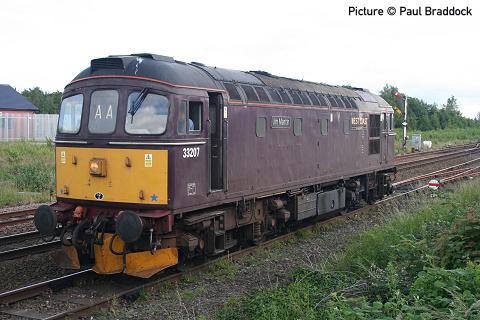
Seen on 4 July by the East Lancashire Railway's main line connection at Castleton, the only working survivor of the narrow-bodied version of the Class 33, 33 207 Jim Martin. This loco is owned by the West Coast Railway Company (WCRC); readers may recall its appearance as support act for the much-missed Cambrian Coast steam service.
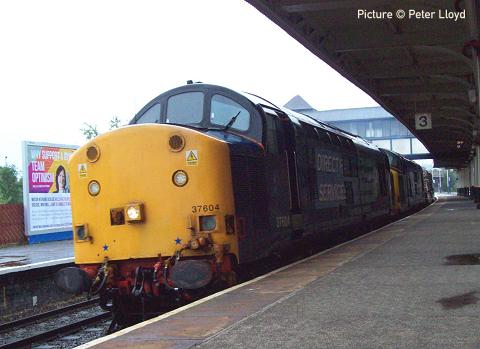
The Valley - Crewe flask train 6K41, which would offer a variety of locos in North Wales, has become something of a rarity of late, as one of the two reactors at Wylfa has now been shut down. Above, 37 604 and 37 229 are seen passing Llandudno Junction at 15:44 on 4 July. Picture by Peter Lloyd.
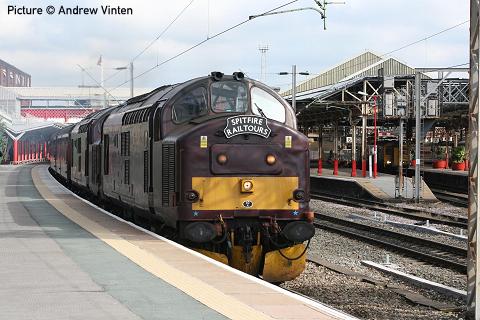
Crewe on 8 July, with a Spitfire Railtours Leeds - Aberystwyth excursion hauled by WCRC locos 37 676 Loch Rannoch and 37 685 Loch Arkaig. Picture by Andrew Vinten. The name Loch Rannoch was a familiar sight at Crewe and on the North Wales line in the 1990s when carried by 37 408. It is pleasant to see that the name has re-appeared.
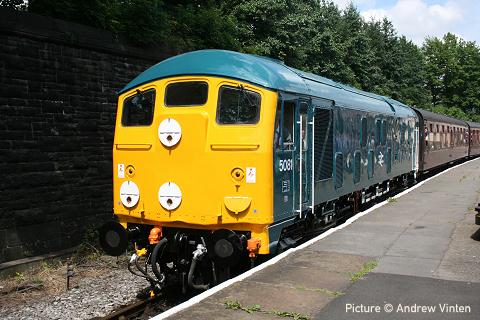
A favourite of North Wales enthusiasts in an earlier era was 24 081 (originally D5081) which fortunately, (unlike 37 408) has been preserved. It is seen above, looking in superb condition, at the recent East Lancashire Railway disel gala (Andrew Vinten).
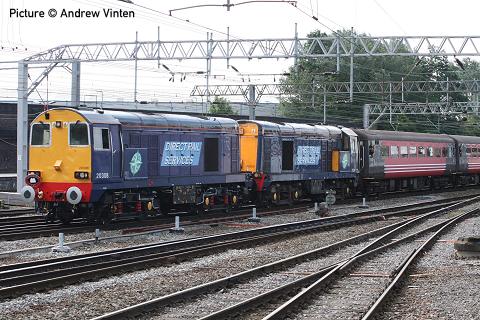
The first diesel type to be chosen by British Railways for production in quantity was the English Electric Type 1, later designated Class 20. On 7 July, 20 308 and 20 209 are seen at Crewe with a Pethfind Tours charter (Andrew Vinten).
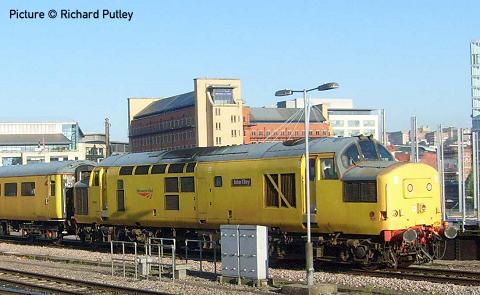
The yellow Class 97/3 (Class 37) locos fitted with ERTMS signalling equipment for the Cambrian Lines do get used on other Network Rail duties when no needed on the Cambrian. Above, 97 304 John Tiley stands at Bristol Temple Meads on 23 July with a measurement train (Richard Putley). We understand that 97 301, the only one of the four not to have ERTMS equipment, is to be fitted with an installation from an alternative supplier to prove that it is not necessary to buy from one company.
The Llandudno 11-coach ban
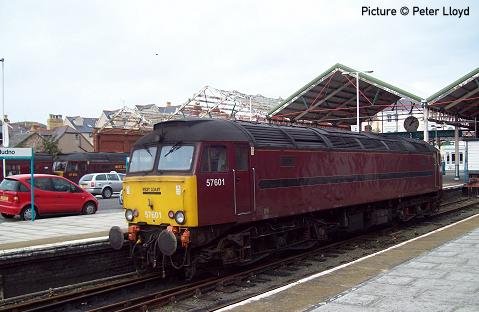
For the record, we should clarify that the recent Statesman Rail excursion train from Llandudno did not in fact start from or return to Llandudno town station, despite the statement by Network Rail reported in the local press that this would be allowed 'just this once' even though it was supposedly too long to clear the track circuits and allow trains to enter other platforms. It started from Llandudno Junction and terminated there in the evening.
Strangely, it appears that the train consist was not in fact 11 coaches, but only 10, plus the loco on the rear, which could surely have been detaches and placed in one of the other platforms, as happened with at least one train in 2008, as the above picture by Peter Lloyd reminds us.
Meanwhile, the several sidings at Llandudno Junction which could be used for stabling excursion trains continue to disappear into the undergrowth as they are considereed the sole preserve or DB Schenker (or is it now Freightliner?)
Chester, Saturday 7 July - report by Roly High
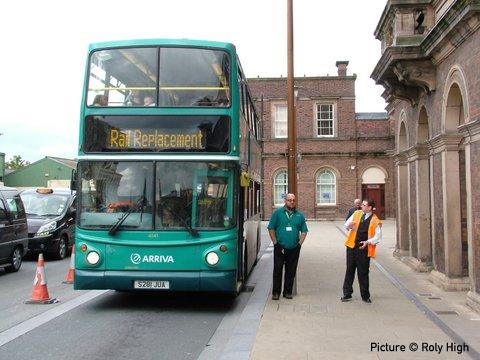
Scenes from Saturday 7 July. Above, a rail replacement bus waits outside Chester station to take passengers from Chester to Hooton because of flooding at Capenhurst. The vehicle, Arriva 4141 - a DAF DB250 with Alexander ALX400 body - is one of several transferred in 2011, after an overhaul and some modifications, to the North West from Arriva's London operation.
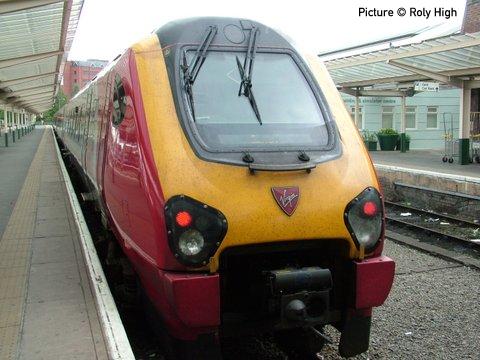
'Super Voyager' 221 114 Sir Francis Drake ready to leave platform 1 with the 11:35 service to Euston.
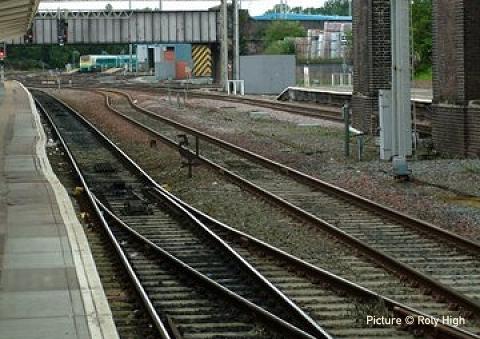
The crossover, at platform 3 showing the recess for clearance when a train pulls into the platform from the centre road.
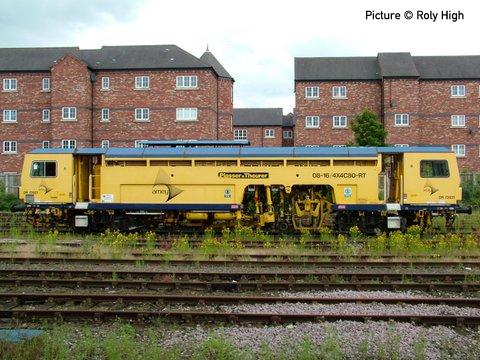
A tamping machine stabled in the sidings at Chester.
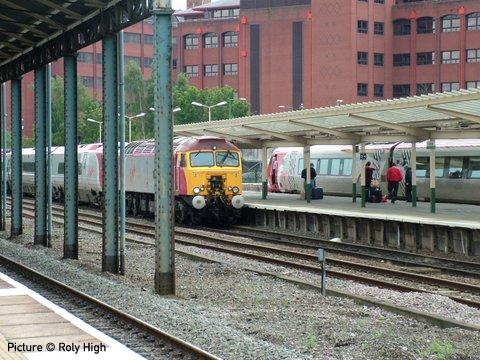
57 308 Tin Tin brings the Saturday London - Holyhead 'Pendolino drag' into platform 3, formed of 390 002 Virgin Angel.
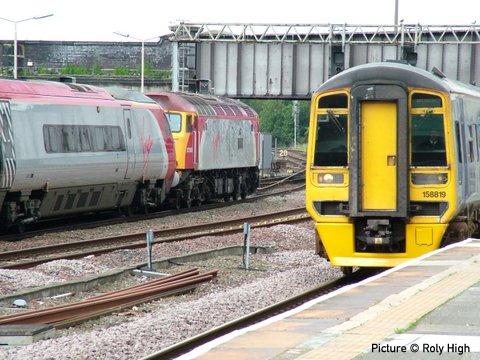
As Tin Tin pulls out bound for Holyhead, one of the last two Class 158s in silver livery, 158 819, rolls in from Birmingham. After reversal, it will depart at 11:24 and follow the Virgin train to Holyhead.
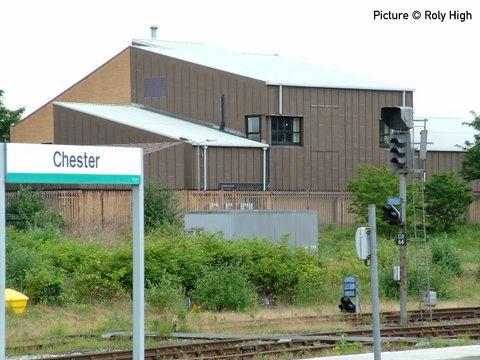
Gone are the days when a station's main signal box was a focal point. This industrial unit is Chester signalling centre, built in the 1980s.
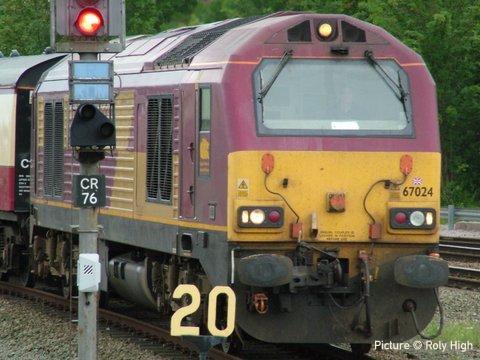
67 024 arrives 'bang on time' with the UK Railtours excursion from Stevenage. The train had south towards King Cross, then through Camden Road Junction to gain access to the the West Coast main line.
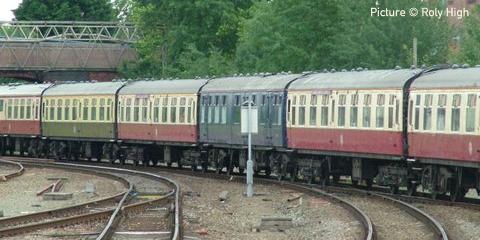
The matching consist of twelve Riviera Trains coaches was spoiled by the scruffy-looking blue kitchen car and a chocolate and cream First Class vehicle among the 'blood and custard'.
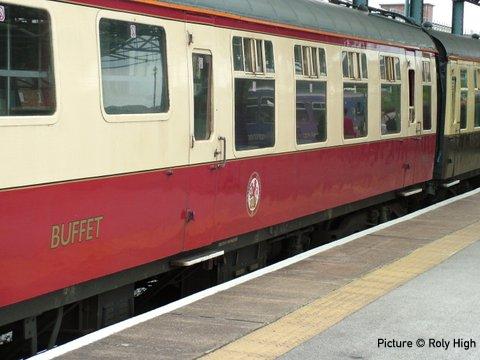
There were three catering vehicles among the 13 coaches: this is 'Miniature Buffet' car M1832 which has recently undergone the refurbishment which is progressing through this fleet of coaches.
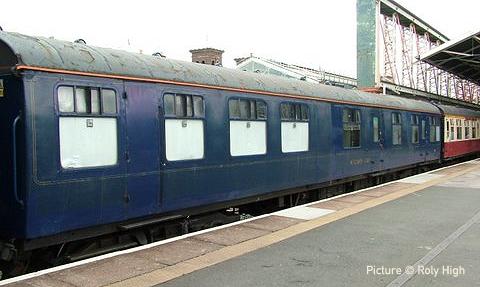
Blue Kitchen Car 1699 is normally part of Riviera's 'Great Briton' set of coaches.
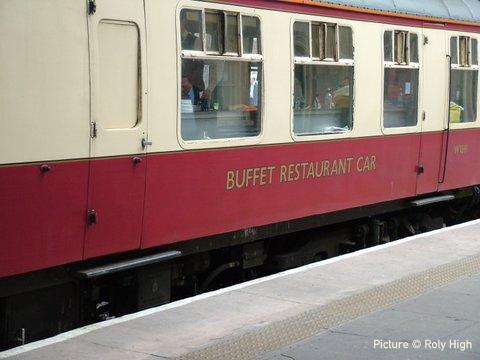
The buffet / kitchen car.
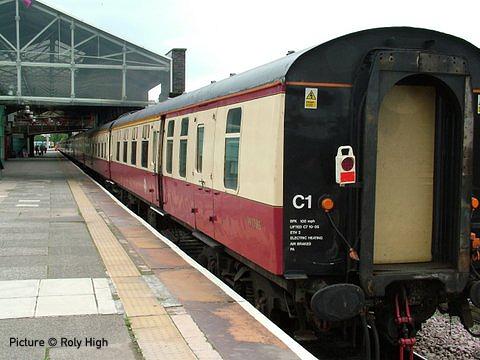
First class brake W17015 provides staff accommodation. Mark 1 coaches were built from the early 1950s: this a relatively modern example, having been built at Swindon Works in 1961, so just 50 years old...
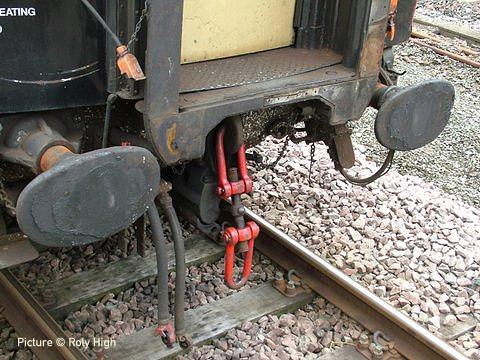
It is now an unusual sight to see a diesel locomotive running round its train in Chester station - or indeed any station. Mk1 coaches have a 'buck-eye' coupler which is used between the coaches in a train, and can be dropped down, as seen here, when a locomotive or any vehicle with screw couplings is to be attached. The actual coupling chain is not linked through the hook, and is carried separately when not required. The buffers do not make contact when the buckeye is used, and have to be pulled outwards and locked in place by collars when the screw coupling is used. The two pipes are part of the air braking circuit.
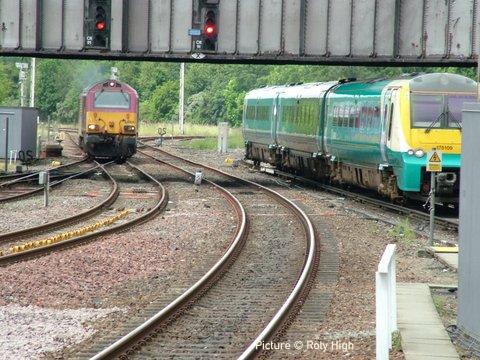
67 024 coming back down the centre road to run around the train; alongside is 175 109 arriving from Llandudno en route to Manchester Piccadilly.
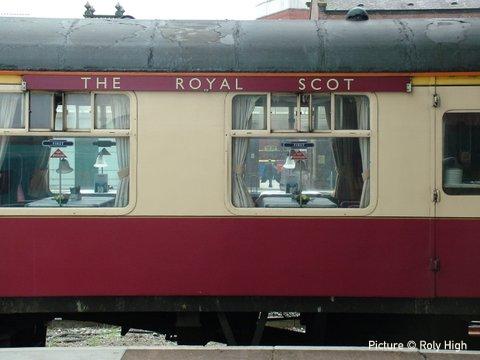
The 'Royal Scot' boards display Riviera's name for this set of coaches, and are nice replicas of the ones once carried on most British express trains, including 'The Royal Scot' which ran from London to Glasgow. The coach numbers have the prefix letters (E, W, S or M) which signified the region of British Railways to which they were once allocated.
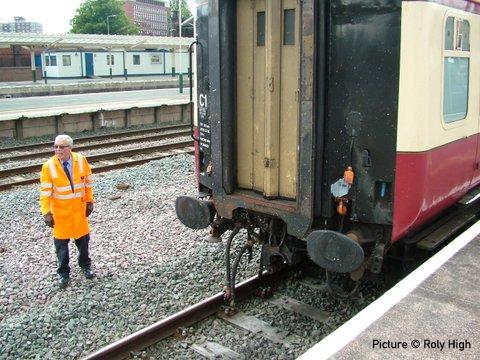
Mick the shunter waiting to couple up. This coach is a Mk2a vehicle dating from the 1960s; the type was well-known to passengers in North Wales back in the 'Class 37' days of the 1990s.
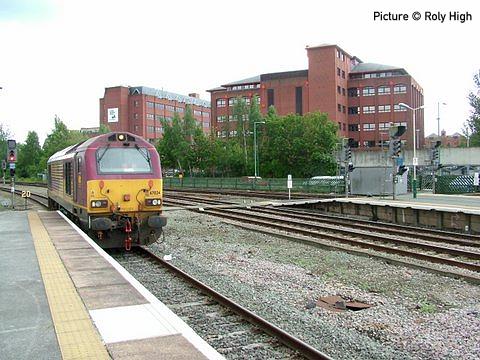
67 024 easing up to the train, screw coupler at the ready.
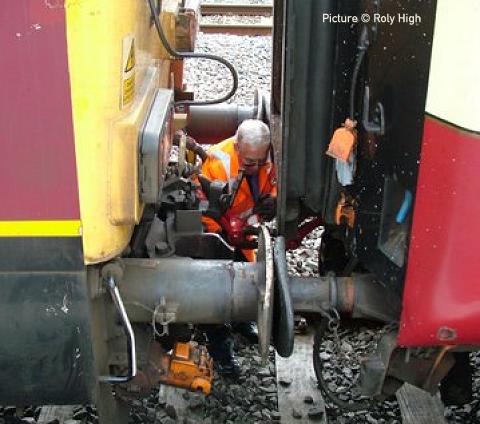
The shunter has to go between the buffers to connect and tighten the coupling and make other connections. In contrast to some other countries, this is only permitted once the locomotive has come to a stand. The collar on the buffer shank can be seen. When not in use it is kept on the nearby bracket; the small chain prevents it from getting lost.
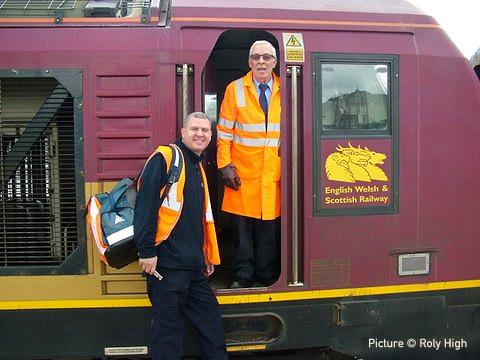
Stuart the driver (left) and Mick the shunter waiting for the off - thanks to them for their co-operation. They were to take the train to Crewe for servicing and stabling, until it was time to return to Chester to pick up the passengers for the return journey. Due to sterling work by Network Rail staff the train was able to to keep to its scheduled path through Wakefield, despite the floods in the region, to join the East Coast main line and head for Stevenage.
(additional text by Charlie Hulme)
North Wales Coast home page Archive Previous Notice Board